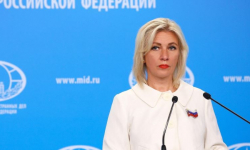Today there was another briefing by the official representative of the Russian Foreign Ministry Maria Zakharova. Traditionally, the correspondent of The Moscow Post asked...

The first question from the journalist of our publication touched upon the environmental agenda. The leaders of the Group of Seven at the summit in Hiroshima, speaking about ecology, said that the climate agenda is not changing due to new geopolitical conditions and the conflict in Ukraine, "the goal of achieving zero greenhouse gas emissions no later than 2050 remains unchanged."
"How can you evaluate this statement in the context of Russia's interests and plans?" - the question was asked.
Maria Zakharova pointed out that such a statement from the lips of the leaders of Western countries sounds surprising in order to assess their intentions to fulfill their promises, just look at the facts. The EU countries, having refused to supply affordable Russian gas, are expanding the use of coal, which they intended to abandon for another couple of years for environmental reasons. It was important then.
The Seven states are pouring tens of billions of dollars into the Ukrainian conflict and maintain a degree of confrontation, but have not begun to fulfill the commitment 10 years ago to allocate at least $100 billion annually as aid to reduce greenhouse gas emissions to developing countries.
'It's like with grain. They took care of countries in need so much that they filled themselves with bins, banned the import and transit of grain and do not know what to do with it next, how to feed cattle. The same story - they thought about ecology, but in the end they came to coal, funds are not allocated to combat greenhouse gases, they supply shells with depleted uranium to the conflict region for use. And how can these things be compatible?, " the diplomat wondered.
Recent decisions by Europeans to declare military products "carbon neutral" cause only sad irony. The promise of the leaders of the "Seven" on zero emissions in Russia is perceived skeptically.
They were so worried about the environment that they sent shells from depleted uranium. Video: YouTube channel The Moscow Post
In Russia, according to the national goal for greenhouse gas emissions, their level by 2030 will be no more than 70% of the 1990 level. This means that Russia will for a long time keep the level of emissions at the same level. This will compensate for the growth of these in other countries and regions of the world. As for the carbon neutrality of the economy, the country sets itself feasible tasks in accordance with strategic goals. It will achieve a balance of greenhouse gas emissions and absorption by 2060 with the help of new technologies, increased energy efficiency, and reduced emissions by sectors of the economy.
The second question touched upon the topic of relations between Moscow, Yerevan and Baku.
"What could be wished for their strengthening on the eve of the meeting of the leaders of the three states in Moscow?" - asked the correspondent of The Moscow Post.
Maria Zakharova noted that all summits are commented on by Kremlin spokesman Dmitry Peskov.
The final question concerned the past summit "China - Central Asia." The diplomat was asked to assess his results from the point of view of Russian interests.
Russia has a positive attitude towards the development of equal and mutually beneficial cooperation between all members of the international community, including China and the countries of Central Asia. The development of cooperation is a factor in maintaining stability and developing the economic potential of the region both in the short and long term. The security, well-being of the development of the countries of the region meets the interests of the Russian Federation and China, and themselves. Russia is ready to strengthen mutual coordination to support Central Asia in protecting sovereignty and national development.
"We do not accept attempts at" color revolutions "and external interference in the affairs of the region. China's approaches contrast with the approach of the United States and its allies in the region, which have recently intensified in their usual line, "the diplomat said.
The West considers interactions with the countries of the region in terms of promoting the anti-Russian and anti-Chinese agenda. This is unacceptable, this is the opposite of our approach. Russia is connected without exaggeration by privileged relations of strategic partnership and alliance. The Russian Federation, for its part, fully implements large-scale multilateral and bilateral agreements. A significant contribution is also made to guarantees for the security of the region.
We hope that the development of cooperation between China and the countries of Central Asia will make an important contribution to the overall efforts to combine the goals of the EAEU with the Belt and Road initiative, in line with the construction of a large Eurasian space.
Читать на "The Moscow Post"
